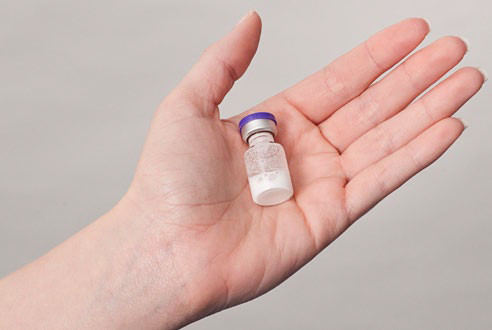Contraceptive Injection
What is the contraceptive injection?
The contraceptive injection is a hormone injection that prevents pregnancy. The injection works for 12 weeks. The injection contains depot medroxyprogesterone acetate (DMPA). DMPA is a hormone similar to progesterone. Progesterone is made naturally in the body by the ovaries.

In Australia the contraceptive injections available are called Depo-Provera and Depo-Ralovera.
How does the contraceptive injection work?
- DMPA is slowly released into the body - the DMPA stops your ovaries from releasing an egg. It also makes the mucus in the cervix thicker so that sperm can't get into the uterus
- each injection protects you from pregnancy for 12 weeks.
- you need to have the injection every 12 weeks if you do not want to get pregnant
- you can make appointments in advance with your doctor so you don't miss an injection
How well does the contraceptive injection work?
The contraceptive injection is very effective at preventing pregnancy. It is 99.8% effective if you have an injection at the correct time every 12 weeks but in real life or in "typical" use it can be lower (96%).
Who can use the contraceptive injection?
Most women can use the contraceptive injection.
You should not use the contraceptive injection if:
- you think you might be pregnant
- you plan to become pregnant soon
- you have unexplained bleeding from your vagina - your doctor will need to talk to you about this
- you have some other health conditions including a history of breast cancer or severe liver disease - your doctor will need to talk to you about this so that you can decide if it is safe for you to use
The injection is not usually the recommended as the first choice for young women under 18 years and women over 45 years because it may reduce bone density in these age groups. It is important to talk to your doctor or nurse to see if the contraceptive injection is a good choice for you. If you are at risk of sexually transmitted infections (STIs) you can use condoms at the same time as using the injection.
Advantages
- Highly effective method which does not contain oestrogen so it can be used by women who cannot use the combined pill or vaginal ring
- It commonly causes vaginal bleeding to stop altogether and is useful for women with heavy menstrual bleeding
- It can be useful to control severe period pain and the symptoms of endometriosis
- It can be used if you are using medications which reduce the effectiveness of some other methods like the Pill and implant
- It can’t be detected by other people
Disadvantages
- It doesn't protect against sexually transmissible infections (STIs)
- It cannot be immediately reversed
- There can be a delay in the return to fertility for up to 18 months
- It can cause irregular bleeding or spotting from the vagina, especially in the first few months
- It can be associated with weight gain
- It may decrease bone density (but this is usually reversible)
While using the injection some women:
- get headaches
- have changes in their mood
- get acne
- have a lowered interest in sex
Talk to your doctor if you develop any unwanted effects - it may be helpful to change the type of contraceptive method you are using.
How is the contraceptive injection given?
- the injection is given in the muscle of your buttock or upper arm
- the best time to have the injection is during the first 5 days of your period - this will protect you from pregnancy straight away
- you can also get the injection later in your cycle if there is no chance of an early pregnancy - this will take 7 days before it works. You will need to use condoms or not have sex for 7 days after you get the injection to prevent an unplanned pregnancy
- if you choose to start the injection during your cycle you should have a pregnancy test before the injection is given and another test in 4 weeks to make sure that you are not pregnant
- it is important to have injections every 12 weeks. If it is more than 14 weeks since your last injection your doctor or nurse will talk to you about when to have the next injection
What if I want to get pregnant after the contraceptive injection?
The contraceptive injection cannot be reversed once it has been given.
When you stop using the injection it can take a while for your periods to go back to normal. It usually takes about 6-9 months. This means that it can take several months before you fall pregnant.
Other types of reversible contraception let your fertility go back to normal more quickly - if you want to get pregnant in the next 12 to 18 months it may be better to use another type of contraception.
If you want to stop using the injection but do not want to get pregnant you will need to:
- use another type of contraception
- start using this contraception 12 weeks after your last injection - when your next injection would have been due
Where can I get the contraceptive injection?
You will need a doctor's prescription to get the injection.
You can get the injection:
- from your local doctor
- from a Family Planning NSW clinic
For more information
Family Planning NSW Talkline - www.fpnsw.org.au/talkline or 1300 658 886
National Relay Service (for deaf people) - 13 36 77
TIS National's interpreting service - 131 450
Visit your nearest Family Planning NSW clinic - www.fpnsw.org.au/clinics
Family Planning NSW client resource on contraception - What suits me?




